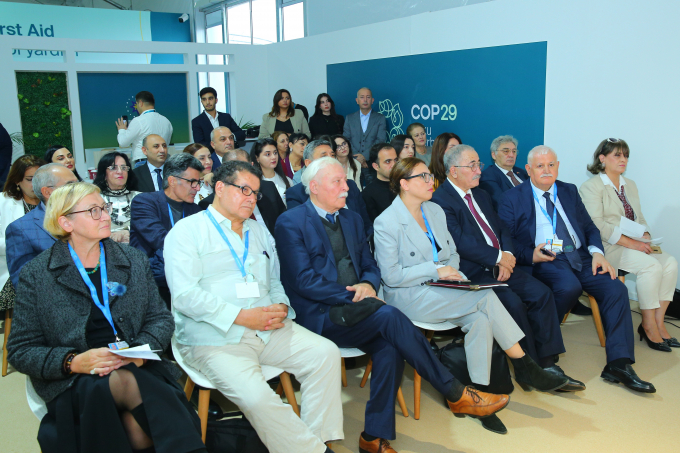Today, as part of the COP29 conference, a panel discussion titled “Strengthening the Role of NGOs in the Climate Crisis: Collaborative Approaches to Sustainable Agriculture, Water Management, and Food Security” was held at the Pavilion of the National NGO Forum located in the Green Zone. Organized by the International Eurasia Press Fund (IEPF), the event brought together local and international experts to discuss specific actions and collaboration opportunities for enhancing the activities of NGOs in combating the climate crisis.
In his opening remarks, Umud Mirzayev, President of the International Eurasia Press Fund, addressed the impacts of the climate crisis on agriculture and water resources. He highlighted that one of IEPF’s main missions as a civil society organization is to create new development opportunities for communities through ecological and humanitarian projects, especially in post-conflict areas. He also emphasized that NGOs could play a significant role in managing water resources, ensuring agricultural sustainability, and safeguarding food security. Concluding his speech, Umud Mirzayev pointed out that NGOs need to undertake more active and structured initiatives to reduce the impacts of climate change and ensure sustainable development for local communities.
The first panelist to speak was Angelė Kėdaitienė from Belgium, a former European Commission member and Secretary-General of Club Climate Europe - Global Climate School, who discussed the importance of international and intergovernmental collaboration in combating climate change in Europe. She stressed the importance of raising awareness about the European Green Deal in recent years and noted that grassroots initiatives by NGOs and citizens have received strong support in this area: “NGOs have substantial potential for implementing resilience strategies. Today, they can assume responsibility and expand their influence in the fight against climate change. There are good opportunities for this. I would like to cite IEPF and its partner organization, ‘Roots of Peace,’ as exemplary NGOs that turn these opportunities into realities.”
A representative from the Azerbaijani Ministry of Agriculture, Leyli Aghayeva, addressed issues related to ensuring the sustainability of agriculture in response to the climate crisis: “Climate change poses serious challenges to the agricultural sector, but it also opens up new opportunities to establish sustainable agricultural systems. The Baku Harmony Climate Initiative aims to strengthen local communities, promote climate-resilient technologies, and encourage efficient resource use. By collaborating with civil society organizations, we can achieve a more resilient and efficient agricultural sector to confront climate change.”
Aysel Salimova, a representative from the Azerbaijan Food Safety Institute (AFSI), discussed the importance of ensuring food security: “Food security is not only about production but also about maintaining quality and safety standards of products. NGO-led awareness and training activities in this area are of exceptional importance. Today, we are witnessing the profound impact of climate change on food security. It is encouraging that the number of partnerships on both international and local levels to address this impact is increasing.”
Professor Alovsat Guliyev, Director of the Institute of Soil Science and Agrochemistry, touched on the impacts of climate change on agriculture and ecological conditions in post-conflict areas. He emphasized the importance of restoring water sources, especially underground canals, and called on NGOs to implement projects for infrastructure renewal and ecosystem restoration in these areas. The professor highlighted the importance of restoring water resources for the resettlement of communities and agricultural development in post-conflict areas and emphasized the need for NGO cooperation with government and international organizations.
Kamel Esseghairi, President of the “Arab Platform for Renewable Energy and Energy Efficiency,” discussed the integration of renewable energy resources into agriculture to mitigate the effects of the climate crisis. Esseghairi emphasized the positive impact of solar and wind energy on agriculture and water resources and their importance in creating sustainability. He noted that NGOs should implement renewable energy sources, carry out pilot projects to promote these technologies, and organize community-related awareness campaigns. Esseghairi pointed out that Azerbaijan has set a goal to increase renewable energy sources to 30% by 2030. “I believe that, as a result of the current policies in this direction, we will witness significant changes.”
At the end of the panel, an open discussion session was held with questions and answers. The discussions concluded with strategic proposals highlighting the strategic role of NGOs in mitigating the impacts of climate change on agriculture and food security.
It should be noted that since 2013, IEPF has been a member of the UN Environment Programme (UNEP) and has implemented numerous projects in the areas of effective water resource management and agricultural development in communities.


